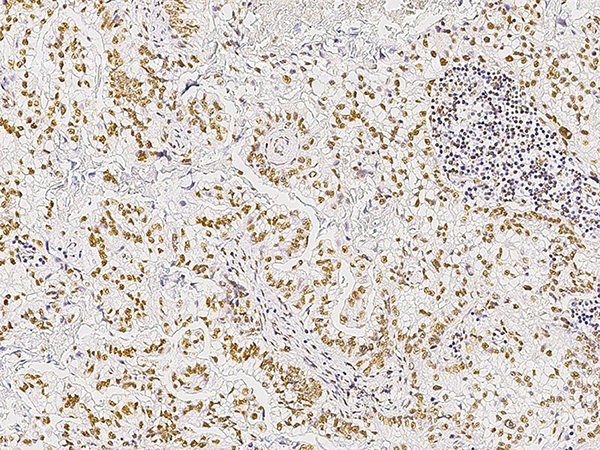-
Product Name
Anti-STK4/MST1 antibody
- Documents
-
Description
Rabbit monoclonal to STK4/MST1
-
Tested applications
IHC-P
-
Species reactivity
Human STK4 / MST1
-
Alternative names
AI447339 antibody; AU020804 antibody; DKFZp686A2068 antibody; Kas-2 antibody; KRS2 antibody; Mst1 antibody; MST1 antibody; MST-1 antibody; MST-1 antibody; RP23-346D16.3 antibody; STK4 antibody; Ysk3 antibody; YSK3 antibody; KRS2 antibody; MST1 antibody; YSK3 antibody; TIIAC antibody; Mst1 antibody; Ysk3 antibody; Kas-2 antibody; AI447339 antibody; AU020804 antibody; Stk4 antibody
- Immunogen
-
Isotype
Rabbit IgG
-
Preparation
This antibody was obtained from a rabbit immunized with purified, recombinant Human STK4 / MST1 (rh STK4 / MST1; Q13043-1; Glu2-Phe487).
-
Clonality
Monoclonal
-
Formulation
0.2 μm filtered solution in PBS with 5% trehalose
-
Storage instructions
This antibody can be stored at 2℃-8℃ for one month without detectable loss of activity. Antibody products are stable for twelve months from date of receipt when stored at -20℃ to -80℃. Preservative-Free.
Sodium azide is recommended to avoid contamination (final concentration 0.05%-0.1%). It is toxic to cells and should be disposed of properly. Avoid repeated freeze-thaw cycles. -
Applications
IHC-P: 10-30 μg/mL
-
Validations

STK4 / MST1 Antibody, Rabbit MAb, Immunochemistry
Immunochemical staining of human STK4 in human stomach carcinoma with rabbit monoclonal antibody (20 µg/mL, formalin-fixed paraffin embedded sections).
-
Background
Stress-activated, pro-apoptotic kinase which, following caspase-cleavage, enters the nucleus and induces chromatin condensation followed by internucleosomal DNA fragmentation. Key component of the Hippo signaling pathway which plays a pivotal role in organ size control and tumor suppression by restricting proliferation and promoting apoptosis. The core of this pathway is composed of a kinase cascade wherein STK3/MST2 and STK4/MST1, in complex with its regulatory protein SAV1, phosphorylates and activates LATS1/2 in complex with its regulatory protein MOB1, which in turn phosphorylates and inactivates YAP1 oncoprotein and WWTR1/TAZ. Phosphorylation of YAP1 by LATS2 inhibits its translocation into the nucleus to regulate cellular genes important for cell proliferation, cell death, and cell migration. STK3/MST2 and STK4/MST1 are required to repress proliferation of mature hepatocytes, to prevent activation of facultative adult liver stem cells (oval cells), and to inhibit tumor formation (By similarity). Phosphorylates 'Ser-14' of histone H2B (H2BS14ph) during apoptosis. Phosphorylates FOXO3 upon oxidative stress, which results in its nuclear translocation and cell death initiation. Phosphorylates MOBKL1A, MOBKL1B and RASSF2. Phosphorylates TNNI3 (cardiac Tn-I) and alters its binding affinity to TNNC1 (cardiac Tn-C) and TNNT2 (cardiac Tn-T). Phosphorylates FOXO1 on 'Ser-212' and regulates its activation and stimulates transcription of PMAIP1 in a FOXO1-dependent manner. Phosphorylates SIRT1 and inhibits SIRT1-mediated p53/TP53 deacetylation, thereby promoting p53/TP53 dependent transcription and apoptosis upon DNA damage. Acts as an inhibitor of PKB/AKT1. Phosphorylates AR on 'Ser-650' and suppresses its activity by intersecting with PKB/AKT1 signaling and antagonizing formation of AR-chromatin complexes.
Related Products / Services
Please note: All products are "FOR RESEARCH USE ONLY AND ARE NOT INTENDED FOR DIAGNOSTIC OR THERAPEUTIC USE"
